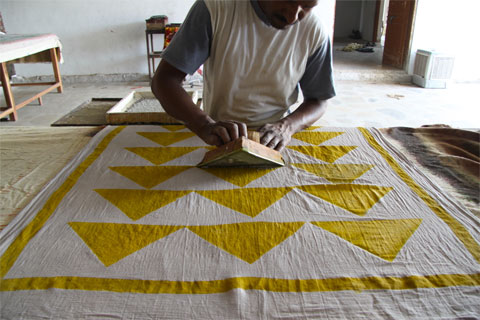This past November, two giant burlap parcels — hand-stitched together and sealed with wax — arrived on Hopie Stockman's Cambridge doorstep. Enclosed was the realization of two years of collaboration with her sister Lily and a small group of artisans in the village of Bagru, India — and a lifetime of creative aspirations. Packaged with care in Bagru and sent across the ocean, they contained the very first order of Block Shop scarves.Hopie (a first-year student at Harvard Business School and the business brains behind Block Shop's operations) says that she and Lily (an MFA student at NYU, a freelance writer/blogger, and Block Shop's sole designer) had long wanted to start their own creative business; as little girls, they labored over handmade cards for family members and painted pottery together. But it wasn't until Lily spent a year in India — living with her husband while he studied water distribution on a Fulbright scholarship — that the sisters found an outlet for their ambitions. In Bagru, Lily fell in love with the vibrant textiles the region is famed for, and the ancient form of block printing used to create them. Through other expats, Lily was introduced to Vijendra Chhipa, a fifth-generation master printer who runs the tiny Bagru-based production operation that hand-prints the funky, beautifully crafted scarves the sisters now sell exclusively online.
 |
Block printing, an ancient art that Hopie says "has little international exposure and is sort of going out of style because it's more expensive," is the practice of using hand-carved wooden blocks of various shapes and sizes to print designs onto textiles. Block Shop creates the scarves' vivid designs with nontoxic vegetable dyes, and all the production's wastewater is recycled as greywater irrigation to the fields surrounding the village.
Hopie says that this focus on eco-friendliness, along with paying fair wages and preserving the village's traditions, are the most important tenets of their fledgling company. "Part of our business model is keeping them [orders placed with Chhipa and his team of up to five printers] small because we want it all to be linked back to Bagru and keep them sustainable." The sisters are currently working to develop a fund to provide eye care for the community of Indian printers. "We're exploring all leads to kind of have a social impact," Hopie says.
For now, Block Shop is operating on a sort of DIY ethos, relying on social media like Pinterest, Instagram, and Lily's blog (bigbangstudio.blogspot.com) to generate buzz for their line, the first order of which, at $120 per scarf, sold out almost immediately. Their focus on melding old world and new, fusing ancient tradition with modern styles, is what makes Block Shop's scarves so unique. And while Hopie says they may one day expand to include other textiles, like pillowcases and bedspreads, and perhaps begin to sell Block Shop through retail outlets, the sisters are currently working on simply adding more variety to their line. When this piece went to print, Hopie had just placed their second order — sign up for their newsletter to get a heads-up when the scarves are back in stock at the end of this month.
>>ACAVALLO[a]PHX.COM
FIND OUT MORE ::AND SIGN UP FOR THE NEWSLETTER AT BLOCKSHOPTEXTILES.COM.